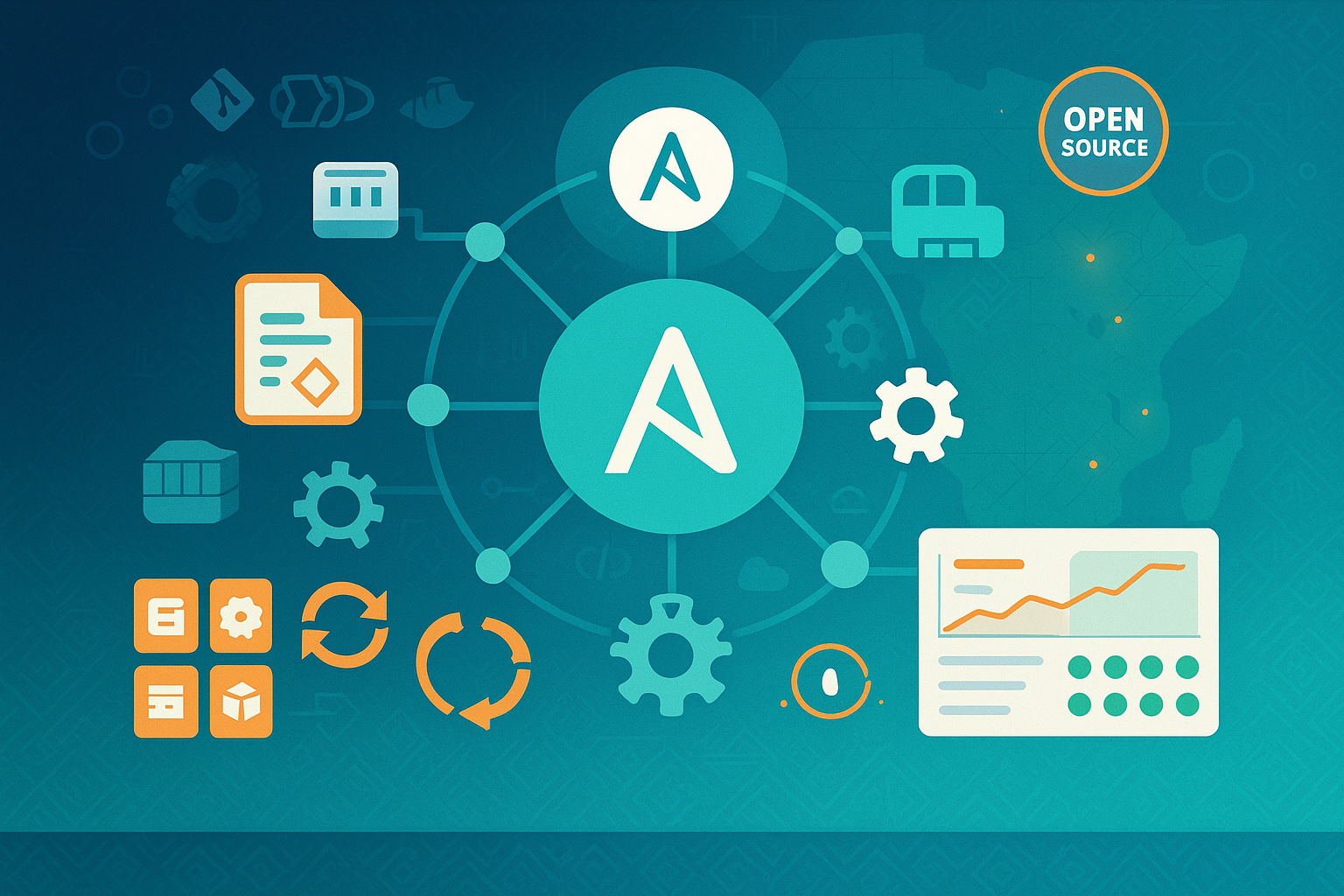
Ansible Fundamentals – Master Modern IT Automation
Learn to automate your IT infrastructure with Ansible, the most popular agentless automation tool. Hands-on 3-day training covering playbooks, inventories, essential modules, and system task automation for DevOps and administrators.
Objectifs de la formation
Upon completion of this training, you will be able to:
- Understand Ansible architecture and its fundamental concepts (inventories, modules, playbooks)
- Install and configure Ansible on various platforms (Linux, macOS)
- Create and manage static and dynamic inventories for your infrastructure
- Write YAML playbooks to automate system administration tasks
- Use essential modules for managing files, services, packages, and users
- Implement variables and facts to make your playbooks dynamic and reusable
- Manage Jinja2 templates to generate customized configurations
- Organize your code with Ansible roles and best practices
- Debug and optimize your playbooks for efficient execution
- Integrate Ansible into your DevOps and CI/CD workflows
Public concerné
This training is designed for:
System Administrators
Professionals looking to automate repetitive tasks and standardize management of their Linux/Unix and Windows servers
DevOps Engineers
Specialists wanting to integrate automation into their CI/CD pipelines and improve Dev/Ops collaboration
Infrastructure Architects
Experts wishing to implement Infrastructure as Code (IaC) and automate resource provisioning
Developers
Programmers wanting to automate application deployments and environment configuration
Cloud Engineers
Professionals managing cloud infrastructures (AWS, Azure, GCP) seeking to automate their management
Training adapted for French-speaking African professionals seeking open source and cost-effective automation tools.
Prérequis
Technical Prerequisites
Required
- Linux/Unix Administration: Knowledge of basic commands, file and process management
- Shell Scripting: Ability to read and understand simple Bash scripts
- Text Editors: Using vi, nano, or equivalent
- Network Concepts: TCP/IP basics, SSH, ports and protocols
- YAML: Basic knowledge or willingness to learn quickly
Recommended
- Windows administration experience (for mixed environments)
- Knowledge of a programming language (Python is a plus)
- Familiarity with Git and versioning
- Virtualization basics (VirtualBox, VMware)
- Experience with a cloud provider
Required Hardware Configuration
For hands-on labs, each participant must have:
- Computer with minimum 8 GB RAM (16 GB recommended)
- 50 GB available disk space
- Virtualization enabled in BIOS
- Stable internet connection (minimum 10 Mbps)
- Administrator rights on the machine
Programme détaillé
Detailed Training Program
Day 1: Introduction and Ansible Fundamentals
Module 1: Introduction to Automation with Ansible (3h)
- System administration evolution: from scripts to automation
- Ansible positioning vs Chef, Puppet, SaltStack
- Agentless architecture: advantages and use cases
- Fundamental concepts:
- Control node and managed nodes
- Inventories and groups
- Modules and collections
- Playbooks and plays
- Installing Ansible (pip, packages, Ansible AWX)
- ansible.cfg configuration and parameter hierarchy
Installing Ansible, initial configuration, first connection test
Module 2: Inventories and Ad-Hoc Commands (4h)
- Creating static inventories
- INI and YAML format
- Groups and subgroups
- Host and group variables
- Selection patterns
- Dynamic inventories
- Inventory scripts
- Cloud plugins (AWS, Azure, GCP)
- CMDB integration
- Ad-Hoc commands
- Essential syntax and options
- Core modules: ping, command, shell, copy
- Parallelism and limiting
- Privilege escalation (become)
Creating complex inventories, executing ad-hoc commands on multiple servers
Day 2: Playbooks and Automation
Module 3: Writing Playbooks (4h)
- YAML structure and playbook syntax
- Plays, tasks, and handlers
- Indentation and YAML best practices
- Name and documentation
- Essential modules
- Package management: yum, apt, pip
- Service management: systemd, service
- File management: file, copy, template
- User management: user, group
- Idempotence and desired states
- Check mode and diff mode
- Execution strategies (linear, free, debug)
Creating a complete playbook to configure a LAMP/LEMP web server
Module 4: Variables, Facts, and Templates (3h)
- Variables in Ansible
- Definition and precedence
- Playbook and inventory variables
- group_vars and host_vars
- Special and magic variables
- Facts and gathering
- Automatic facts
- Custom facts
- Facts caching
- set_fact and register
- Jinja2 templates
- Syntax and expressions
- Filters and tests
- Loops and conditions
- Macros and inheritance
Creating dynamic templates for multi-environment configurations
Day 3: Organization and Best Practices
Module 5: Advanced Structures and Roles (4h)
- Control structures
- Conditions with when
- Loops: loop, with_items, with_dict
- Blocks and error handling
- Tags and limits
- Ansible Roles
- Standard role structure
- Creating with ansible-galaxy init
- Dependencies and meta
- Defaults vs vars
- Ansible Galaxy and Collections
- Using community roles
- Requirements.yml
- Ansible 2.9+ collections
- Creating custom collections
Creating a reusable role, publishing to private Galaxy
Module 6: Debugging and DevOps Integration (3h)
- Debugging techniques
- Debug module and verbosity
- Strategy: debug
- Ansible-lint and validation
- Logs and callbacks
- Ansible Vault
- Encrypting sensitive data
- Managing vault passwords
- Multiple vault IDs
- CI/CD Integration
- Ansible in Jenkins/GitLab CI
- Testing with Molecule
- AWX/Tower for orchestration
- Webhooks and REST API
- Performance and optimization
- Pipelining and ControlPersist
- Mitogen and acceleration
- Facts caching with Redis
Complete automation of a multi-tier application deployment
Certification and Assessment
- Knowledge assessment quiz at the end of training
- ECINTELLIGENCE training certificate
- Complete course materials in English (200+ pages)
- Online lab access for 30 days
- Optional preparation for Red Hat EX294 (RHCE) certification
- Private Slack community for post-training support
Certification
À l'issue de cette formation, vous recevrez une attestation de participation délivrée par ECINTELLIGENCE.
Autres formations qui pourraient vous intéresser
Prêt à développer vos compétences ?
Rejoignez des centaines de professionnels qui ont fait confiance à ECINTELLIGENCE pour leur montée en compétences.
Voir toutes nos formations